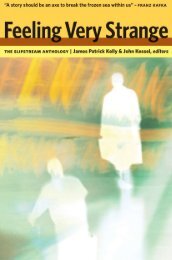The Curse of the Wer.. - Site de Thomas - Free
The Curse of the Wer.. - Site de Thomas - Free
The Curse of the Wer.. - Site de Thomas - Free
You also want an ePaper? Increase the reach of your titles
YUMPU automatically turns print PDFs into web optimized ePapers that Google loves.
NOTES<br />
(anon.); Old Norse Völsungsaga (anon., written down c. thirteenth century);<br />
fourteenth-century Arthur and Gorgalon (anon.).<br />
4. See Jacobus Sprenger and Heinrich Kramer, Malleus Maleficarum (1486);<br />
Jean Bodin, De la Demonomanie <strong>de</strong>s Sorciers (Paris, 1580); Henri Boguet,<br />
Discours <strong>de</strong>s Sorciers (Lyons, 1590); George Bores, trans., A True Discourse<br />
Declaring <strong>the</strong> Damnable Life and Death <strong>of</strong> One Stubbe Peeter (original<br />
trial manuscript) (London, 1590); James I, Daemonologie (Edinburgh,<br />
1597).<br />
5. See Johann Wier, De Praestigiis Daemonum (Basel, 1563); Reginald Scot,<br />
<strong>The</strong> Discoverie <strong>of</strong> Witchcraft (London, 1584); Robert Burton, <strong>The</strong> Anatomy<br />
<strong>of</strong> Melancholy (London, 1621).<br />
6. Laurent Bor<strong>de</strong>lon, ‘Preface’, A History <strong>of</strong> <strong>the</strong> Ridiculous Extravagancies<br />
<strong>of</strong> Monsieur Oufle (1711; originally published in French, 1710) (London<br />
and New York: Garland Publishing, 1973), p. i.<br />
7. Ibid., p. 8.<br />
8. Ibid., p. 5.<br />
9. David Punter, <strong>The</strong> Literature <strong>of</strong> Terror: A History <strong>of</strong> Gothic Fictions from<br />
1765 to <strong>the</strong> Present Day, vol. 2: <strong>The</strong> Mo<strong>de</strong>rn Gothic (London and New York:<br />
Longman, 1996), pp. 202–3.<br />
10. Tobin Siebers, <strong>The</strong> Romantic Fantastic (Ithaca and London: Cornell<br />
University Press, 1984), p. 21.<br />
11. <strong>The</strong> asterisked statement appears as a footnote in <strong>the</strong> original publication.<br />
Charles Robert Maturin, <strong>The</strong> Albigenses, vol. 2 (1824) (New York: Arno<br />
Press, 1974), pp. 262–3.<br />
12. Raymond Williams, Keywords: A Vocabulary <strong>of</strong> Culture and Society<br />
(Glasgow: Fontana, 1976), pp. 152, 153.<br />
13. Leopold von Ranke, ‘Preface’ to Histories <strong>of</strong> <strong>the</strong> Latin and Germanic<br />
Nations from 1494–1514 (1824), reprinted in F. Stern (ed.), <strong>The</strong> Varieties<br />
<strong>of</strong> History (London: Macmillan, 1970), p. 57.<br />
14. Ranke, quoted in Peter Gay and Victor G. Wexler (eds), Historians at<br />
Work, vol. 3 (New York, Harper & Row, 1975), p. 17.<br />
15. Ranke, ‘Preface’ in Stern (ed.), <strong>The</strong> Varieties <strong>of</strong> History, p. 57.<br />
16. In Émile (1762), Rousseau wrote: ‘<strong>The</strong> misuse <strong>of</strong> books is <strong>the</strong> <strong>de</strong>ath <strong>of</strong><br />
sound learning. People think <strong>the</strong>y know what <strong>the</strong>y have read, and take no<br />
pains to learn. Too much reading only produces a pretentious ignoramus.<br />
<strong>The</strong>re was never so much reading in any age as <strong>the</strong> present, and never was<br />
<strong>the</strong>re less learning.’ Jean-Jacques Rousseau, Émile, trans. Barbara Foxley<br />
(London: J.M. Dent, 1974), quoted in Niall Lucy, Postmo<strong>de</strong>rn Literary<br />
<strong>The</strong>ory (Oxford: Blackwell, 1997), pp. 45–6.<br />
17. Edward Said, paraphrased by Anne McClintock, Imperial Lea<strong>the</strong>r: Race,<br />
Gen<strong>de</strong>r and Sexuality in <strong>the</strong> Colonial Contest (New York and London:<br />
Routledge, 1995), p. 300.<br />
153





